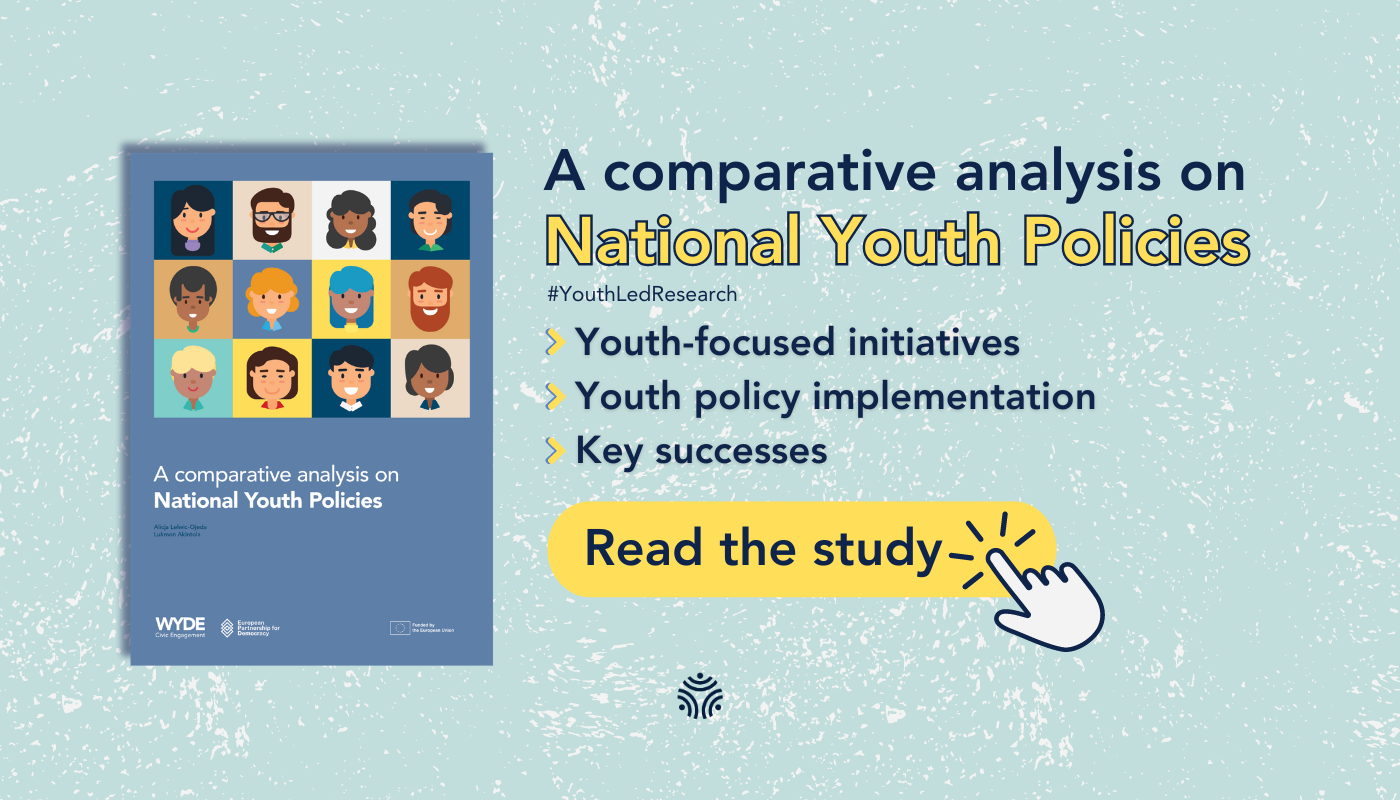
Introducing Research on Youth Participation in Public Affairs
In a world where over 1.8 billion youth are stepping up to lead the charge towards a brighter future, the power and potential of young people in shaping the destiny of our democracies is undeniable. Whether expressing political opinions, championing human rights, or implementing innovative solutions, young people are pivotal in driving public policy and civic engagement.
Acknowledging the immense potential for change, the Youth Democracy Cohort is excited to share a comprehensive examination of successful youth-led policy initiatives drawing from the insights of a scoping study “A comparative analysis on National Youth Policies” authored by Alicja Lelwic-Ojeda and Lukmon Akintola. Between April and October 2024, the YDC will release on a country-by-country basis, examples of exceptional practices of youth political participation. Based on concrete examples of government action, a series of policy recommendations aimed at fostering successful youth leadership will be presented as well. This youth-focused research initiative is aligned with YDC’s broader goal of empowering young researchers and amplifying their voices in academic and policy debates through the WYDE Civic Engagement initiative.
Meet the Authors

Alicja Lelwic-Ojeda is a policy advisor specialising in participatory policy-making and rights-based approaches to development. Her areas of expertise include youth participation, socioeconomic inclusion of marginalised groups, and migration governance.
On behalf of organisations such as the European Partnership for Democracy, European Commission, and the British Government, Alicja analysed youth participation strategies of national governments, researched the implementation of mobility and skills partnerships, and helped shape youth employment strategies in South Africa. Alicja currently serves as Co-Director within the United Nations Major Group for Children and Youth, where she facilitates the inclusion of youth priorities and voices in migration policy processes. She holds a Bachelor’s degree from Sciences Po Paris and an MSc in Public Administration from Erasmus University Rotterdam.

Lukmon Akintola is a researcher and a policy advisor working at the intersection of climate change, human security, migration, and inclusive governance. He holds a master’s degree in Politics and International Relations from Peking University, Beijing. He currently serves as a Knowledge Advisor at the Global Center for Climate Mobility, where he is supporting the Africa Climate Mobility Initiative (ACMI) Deep Dive project in West Africa. He is also serving as the climate mobility lead for the African Non-State Actors of the GFMD/GCM. Lukmon previously worked as the program lead at the Migration Youth and Children Platform (MYCP) and has consulted for several international organisations, including UNICEF, Friedrich Ebert Stiftung, European Partnership for Democracy, and Save the Children, among others.
Why now?
With the global youth population at an all-time high, young people’s energy and enthusiasm are crucial for major initiatives like sustainable development, and nation-building, as they are agents of change, innovators, and future leaders.Young people are shaping policies, driving economies, and advocating for a more just and equitable world through their voices, ideas, and actions. Yet, despite their undeniable contribution, youth face major barriers to meaningful participation in public affairs. Institutional biases, limited opportunities, and lack of civic education show a path fraught with many challenges on the road to empowerment.
Closer look at the study
The study zooms in on ten countries: Australia, Costa Rica, Georgia, Kenya, Liberia, Malta, Morocco, Nepal, Solomon Islands, and The Philippines. Each offering unique insights into youth-focused policies and initiatives, showcasing a spectrum of challenges and opportunities. While some nations grapple with barriers hindering inclusive futures, others illustrate positive examples of youth engagement, including civic participation and political reforms.
Despite the progress made, significant hurdles persist, such as constitutional limitations, inadequate civic education, and political instability. However, by spotlighting success stories and best practices, the aim is to inspire action and reveal the transformative potential of youth inclusion.
Join #YouthLedResearch
Stay tuned for special releases on each of the ten countries, as each example demonstrates a shift toward a better, more sustainable future for youth inclusion, alongside policy recommendations aimed at unlocking and improving youth potential. Engage with #YouthLedResearch by by spreading the word on social media to amplify the impact of the youth led research.
Read the full study by Alicja Lelwic – Ojeda and Lukmon Akintola to get deeper insights into each case country, the challenges, and opportunities for creating a better space for youth political participation.
